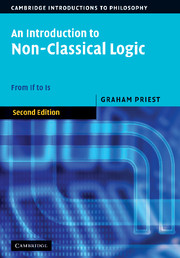Book contents
- Frontmatter
- Contents
- Preface to the First Edition
- Preface to the Second Edition
- Mathematical Prolegomenon
- Part I Propositional Logic
- Part II Quantification and Identity
- 12 Classical First-order Logic
- 13 Free Logics
- 14 Constant Domain Modal Logics
- 15 Variable Domain Modal Logics
- 16 Necessary Identity in Modal Logic
- 17 Contingent Identity in Modal Logic
- 18 Non-normal Modal Logics
- 19 Conditional Logics
- 20 Intuitionist Logic
- 21 Many-valued Logics
- 22 First Degree Entailment
- 23 Logics with Gaps, Gluts and Worlds
- 24 Relevant Logics
- 25 Fuzzy Logics
- Postscript: A Methodological Coda
- References
- Index of Names
- Index of Subjects
21 - Many-valued Logics
Published online by Cambridge University Press: 05 June 2012
- Frontmatter
- Contents
- Preface to the First Edition
- Preface to the Second Edition
- Mathematical Prolegomenon
- Part I Propositional Logic
- Part II Quantification and Identity
- 12 Classical First-order Logic
- 13 Free Logics
- 14 Constant Domain Modal Logics
- 15 Variable Domain Modal Logics
- 16 Necessary Identity in Modal Logic
- 17 Contingent Identity in Modal Logic
- 18 Non-normal Modal Logics
- 19 Conditional Logics
- 20 Intuitionist Logic
- 21 Many-valued Logics
- 22 First Degree Entailment
- 23 Logics with Gaps, Gluts and Worlds
- 24 Relevant Logics
- 25 Fuzzy Logics
- Postscript: A Methodological Coda
- References
- Index of Names
- Index of Subjects
Summary
Introduction
21.1.1 In this chapter we leave world-semantics for the time being, and turn to many-valued logics.
21.1.2 We will start with a brief look at the general situation concerning many-valued logics, before turning to the special cases of the 3-valued logics of chapter 7 for more detailed consideration.
21.1.3 Free versions of these logics are next on the agenda – in particular, now that we have the machinery of truth value gaps at our finger tips, the neutral free logics mentioned in 13.4.7. This will occasion a discussion of the behaviour of the existence predicate in a many-valued logic, and the question of whether it might make good philosophical sense for a statement of existence to have a non-classical value.
21.1.4 Next, we turn to the behaviour of identity in many-valued logics, and particularly the 3-valued logics of chapter 7. This will occasion a discussion of whether identity statements may plausibly be taken to have non-classical values.
21.1.5 We will finish with a few comments on supervaluations and subvaluations in the context of quantificational logic.
Quantified Many-valued Logics
21.2.1 As we saw in 7.2.2, a propositional many-valued logic is characterised by a structure 〈V,D,{fc : c ∈ C}〉, where V is the set of truth values, D ⊆ V is the set of designated values, and for each connective, c, fc is the truth function it denotes.
- Type
- Chapter
- Information
- An Introduction to Non-Classical LogicFrom If to Is, pp. 456 - 475Publisher: Cambridge University PressPrint publication year: 2008



